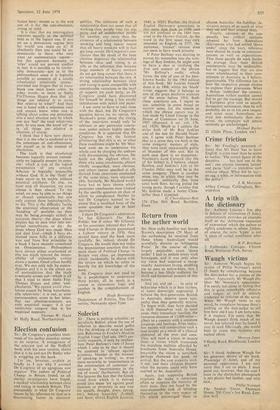Solecist
Sir: There is nothing solecistic, or peculiarly Balliol, about the use of solecism to. describe social gaffes like the drinking of soup at lunch- eon. Reference to Fowler's Modern English Usage (2nd cdn. 1965) cer- tainly supports, if only by implica- tion, Peter Berliner's view (5 June) which I take to be that it should be confined to 'offence against grammar, blunder in the manner of speaking or writing', or, even more narrowly, to 'incorrectness in the construction of sentences' as opposed to 'incorrectness in the use of words' (barbarism). But all this ignores the fact that the Greek word from which it is derived could also mean 'err against good manners or propriety in any way (in speech, thought, dress, eating, etc.), behave boorishly' (Liddell and Scott, Greek-English Lexicon, 1940, p. 1621). Further, the Oxford. English Dictionary quotations in this sense date back to 1599, and are not confined to the 1884 item cited in the Shorter Oxford. As the
word in the first sense was only recorded in English in 1577, the narrower, 'correct' version does not seem to have much priority.
If Peter Berliner was desiring to pursue his researches into the writ- ings of Roy Jenkins, he might care to have a shot at verifying the date and context of the phrase 'Mr Balfour's oodle' which forms the title of one of his best- known books. In the 1968 edition of this book, Mr Jenkins himself dates it to 1908, whilst his 'blurb' writer suggests that it belongs to one of the great platform orations of the years before 1914. Both these assertions are, 1 regret to say, solecistic in some broad or narrow sense, for the speech in which the phrase occurs was in fact made by Lloyd George in the House of Commons on 26 June, 1907 (Hansard, 4 ser. vol. 176, col. 1429). Much as I admire the styles both of Mr Roy Jenkins and of the late Sir Harold Nicol- son, I agree with Peter Berliner that in a sense they are both in the same category; masters of style, they were (are) occasionally guilty of blunders of this sort. But in each case there is an exception: Nicolson's Lord Carnock (his life of his father) is, I believe, almost flawless, and Jenkins's Life of Sir Charles Mike may well be in the same category. There is another sense, too, in which they may be compared : politically they were (are) both flops, having joined the wrong party, though I confess that Mr Jenkins made a better Chan- cellor than I expected.
G. Chowdharay-Best 174 Clay Hill Road, Basildon,. Essex


































 Previous page
Previous page